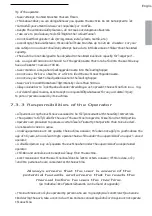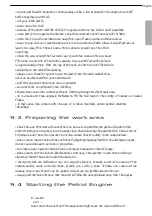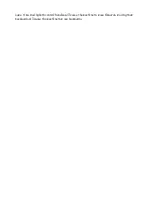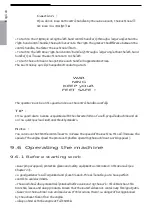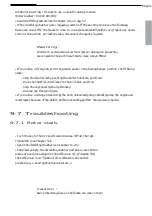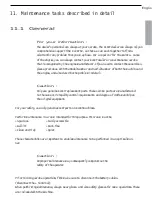
E nglish
• Do not add fuel while engine is running.
Always all
ow a few minutes for the engine to cool off
before topping up with fuel.
• Only use fresh petrol.
• Never add oil
to fuel.
• Because of the short shelf li
fe of fuel, it is good practi
ce to buy fuel in small quantiti
es.
• Store petrol in an approved container. Keep this container out of the reach of children.
• Store fuel in a well
-ventila
ted area away from open flames, sparks and heat sources.
• Never top up fuel at a location where work is to be performed later. Always keep all
persons at
least 10 m away from the work area. This is done to prevent any fires from
occurring.
• Clean the area around the fuel tank cap (1) and then remove this cap. Never
fil
l a tank to over 85% of the tank’s capacity. Top up with fuel until the level
is approximately 20 m m from the top of the tank. In short, do not fil
l the tank
completely to the tank fille
r opening.
• Always use a funnel or spout to pour the petrol into the tank. Suitable fun-
nels can be obtained from your ELIET dealer.
• Refit
the cap onto the tank as soon as possibl
e.
• Be careful not to spill
petrol onto clothing.
If petrol does come into contact with your clothing,
change this clothing at once.
• It is unsafe and thus expressly forbidden to fil
l the fuel tank in the vicini
ty of smokers or naked
flames.
• If fuel comes into contact with the eyes or is taken internall
y, obtain medical attention
immediately.
9.3 Preparing the work area
• Clear the area first where the machine is to be used. In addition,
the paths along which the
plant trimmings are removed, must be kept clear, thus releasing the operator from the worries of
tripping up over them. The operator must also ensure that his safety is not compromised.
• Make sure to locate the machine such that flying chippings expelled from the discharge output
do not cause damage to persons or properties.
• On slopes, never operate the machine (no forward, backward or lateral slope).
• Make sure to sort the material
beforehand. In this way, the operator is sure that no foreign
objects will
enter the machine with the material.
• Foreign objects are defined as: any non-organic object or branchy material
in excess of the
stated capacity (such as m etal, stone, plastic, pvc, cords,…).
Some of these can cause serious
damage to your machine or can be ejected, virtually
as projectil
es towards the user.
• Aways positio
n the machine so that the wind will blow the dust produced away from the engine.
9.4 Starting the Petrol Engine
Cauti
on :
Never start the machine if the engine cooling fins are not clean and free of
Summary of Contents for Superprof 2000
Page 1: ...M A NU AL Superprof...
Page 2: ...lish...
Page 14: ...E nglis BQ 505 010160 BQ 505 112116 BQ 505 010130 BQ 505010 070...
Page 22: ...gi ven by theenginemake...
Page 24: ...thewar r ant y card...
Page 26: ...pr ope rt y...
Page 28: ...debrist o pr ot ectitf orm ov erh eating...
Page 30: ...si t uationwher e you no longerhave cont rolov erthework...
Page 36: ...rearfla p...
Page 39: ...28...
Page 46: ...engine and remov e theignit i onkey...
Page 48: ...r emov e theexc es s oil...
Page 51: ...anglegrinderwitha grindingdi sc sui t ablef ors t eel...
Page 53: ...no purp os e Thi s i s th e time t o rev ers e or r enew th e blad es...
Page 55: ...gr oup...








